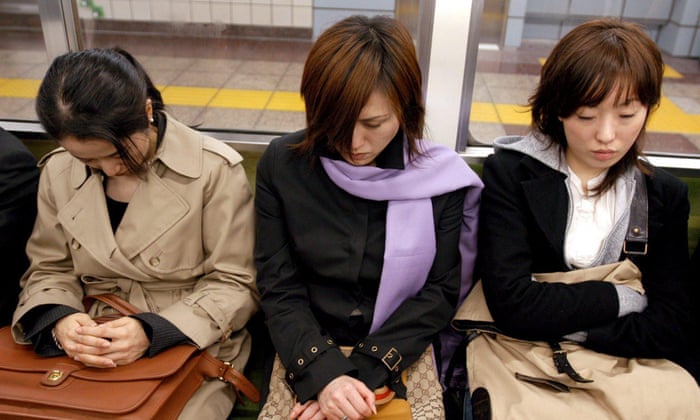A Brief Colonial History Of Ceylon(SriLanka)
Sri Lanka: One Island Two Nations
A Brief Colonial History Of Ceylon(SriLanka)
Sri Lanka: One Island Two Nations
(Full Story)
Search This Blog
Back to 500BC.
==========================
Thiranjala Weerasinghe sj.- One Island Two Nations
?????????????????????????????????????????????????Thursday, March 3, 2016
Nearly a third of Japan's women 'sexually harassed at work'
Survey showing women were touched inappropriately and pressed for sex deals blow to efforts to support female workers

Commuters in Tokyo. Photograph: Andy Rain/EPA
Almost a third of Japanese women have been sexually harassed at work,
according to a government report that deals another blow to attempts to
boost women’s role in the workplace.
More than half of those women said they had been subjected to casual
comments – mostly by male colleagues – about their appearance, age and
physical features.
In the most serious cases victims said they had been repeatedly asked out, pressed to have sex or been touched inappropriately.
In the first survey of its kind in Japan,
the health, labour and welfare ministry said 30% of respondents in
full- and part-time employment reported being sexually harassed at work.
Among full-time workers, the figure rose to 35%.
The survey of more than 9,600 women aged 25-44 who are currently working
or were previously employed found that 40% had been touched in an
unpleasant way while 17% had been “asked or pressed to have a sexual
relationship”.
The most frequent perpetrators – in 24.1% of cases – were the women’s bosses.
The survey also revealed a general reluctance among women to lodge
official complaints about their treatment: 63% said they had suffered in
silence, while about one in 10 who did complain said they had been
given an unsympathetic hearing or been demoted.
Japan is struggling to raise the profile of women in the workplace,
particularly in senior positions. While they are well represented in the
part-time, low-paid economy, only a tiny number of executives at
Japan’s 3,600 listed companies are female.
The prime minister, Shinzo Abe,
has set an ambitious target to fill 30% of leadership positions with
women by 2020 – an aim many experts believe is unattainable.
At present, women account for just 8% of senior roles in companies
employing 100 people or more, compared to a global average of 22%,
according to the Grant Thornton International Business Report 2015.
Abe’s “womenomics” programme also calls for an increase in the size of
the female workforce to encourage growth. Economists have warned that
without them, the country faces economic decline as its population falls
and its workforce continues to shrink.
The treatment of women at work gained widespread attention in 2014 after male members of the Tokyo metropolitan assembly shouted sexist abuse at Ayaka Shiomura as she questioned the city’s commitment to helping pregnant women and young mothers.
Many working women in Japan also report being harassed when they become pregnant.
A health ministry survey last year found that almost 50% of women sent
to corporate clients by temp agencies encountered victimisation ranging
from dismissal and demotion to unfair treatment and verbal abuse.
The survey found that just over a fifth of full-time employees were also subjected to “maternity harassment”.
Japan performs poorly in international gender equality comparisons. In the World Economic Forum’s 2015 global gender gap index, it ranked 101st out of 145 countries.
